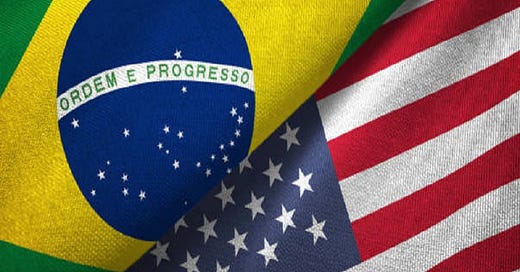Their tangible cooperation potential in proselytizing “wokeism” across the world via close coordination at multilateral fora more than compensates for the challenges posed by Lula’s decision to de-dollarize trade with China, the latter of which won’t unfold right away due to practical difficulties with its implementation. The newfound liberal-globalist worldview that unites Brazil and the US after his re-election is therefore much more powerful than their divergent interests over the future of the global financial system when calmly compared.
US Ambassador to the UN Linda Thomas-Greenfield is visiting Brazil from 2-4 May to discuss a wide range of issues relevant to their bilateral relations according to a background briefing by a senior US official the day before she departed. The present piece will draw attention to the highlights from that call in order to clarify the state of Brazilian-US ties during President Lula’s third term, which have been manipulated by disinformation agents in recent months for self-serving domestic political reasons.
According to the unnamed source who briefed reporters on Monday, Thomas-Greenfield will discuss the gamut of Brazilian-US relations during her trip, though with a specific focus on issues pertaining to their global agenda. These concern climate, ethno-racial equality, food security, immigration (particularly from neighboring Venezuela), cooperation at multilateral fora, Russia (including detained spy Sergey Cherkasov who the US wants extradited to face charges), and security cooperation in Haiti.
The climate, ethno-racial equality, and immigration dimensions of her planned conversations with Brazilian officials align with those two’s liberal-globalist ideology. Lula feels so strongly about proselytizing their shared views on these issues across the world that he reportedly proposed launching a global influence network with the US Democrats to that end during his trip to DC in February. Accordingly, this aspect of their talks will solidify his ideological alliance with Biden.
Regarding Russia, the senior official downplayed the impact that Lula’s recent peace rhetoric had on their relations, remaindering reporters that Brazil has voted with the US to condemn Moscow. They also dismissed a question about whether efforts to secure Cherkasov’s extradition could be complicated by Brazil voting with Russia to investigate the Nord Stream attack. Similarly, that source didn’t overreact to Lula’s visit to China nor Lavrov’s trip to Brazil.
About those, these four pieces here, here, here, and here detail Lula’s envisaged grand strategy, which is simply to “balance” (however clumsily) between de-dollarizing with China and proselytizing “wokeism” across the world in partnership with the US Democrats. Russia’s role is expendable as proven by him placing conditions on his visit there to attend next month’s St. Petersburg International Economic Forum per President Putin’s invitation that was recently conveyed by Lavrov.
The prior criticism of Lula in the Western media for his recent peace rhetoric has abated and can be interpreted in hindsight as simply a means to maximally pressure him in line with the US’ policy of abusing all its partners as vassals. In fact, ahead of Thomas-Greenfield’s trip, a “rehabilitation” of his reputation is visibly underway as evidenced by the New York Times’ latest detailed opinion piece explaining why it’s wrong to regard him as “anti-American” like some in the media have earlier done.
It's indeed true that his dual desires to de-dollarize with China and exploit the optics of his peace rhetoric for self-promotional purposes, both of which provoked the West’s ire, are pragmatic because they correspond with his understanding of Brazil’s national interests. While it’s arguable whether the second-mentioned part is objectively or subjectively in his country’s interests, there’s no doubt that reducing dependence on the dollar certainly is even if it’ll be very difficult to do in practice.
By explaining this to the Western audience, the NYT complemented the unnamed senior US official’s efforts the day prior to downplay the mostly superficial differences in bilateral ties ahead of Thomas-Greenfield’s trip, which aim ensure that it’s as successful as possible in strengthening their relations. This observation suggests that the US accepts that it and Brazil have partially diverging interests, largely over the future of the global financial system, but that more unites these two than divides them.
After all, Lula’s recent peace rhetoric is purely for self-promotional purposes even if it inadvertently has the effect of contradicting the West’s soft power interests related to solely blaming Russia for the latest phase of the Ukrainian Conflict that began last year. While their differences over de-dollarization are irreconcilable, they don’t preclude the possibility of these two jointly proselytizing “wokeism” across the world through Lula’s reportedly proposed global influence network with the US Democrats.
Their tangible cooperation potential in that regard via close coordination at multilateral fora more than compensates for the challenges posed by his decision to de-dollarize trade with China, the latter of which won’t unfold right away due to practical difficulties with its implementation. The newfound liberal-globalist worldview that unites Brazil and the US after Lula’s re-election is therefore much more powerful than their divergent interests over the future of the global financial system when calmly compared.
This insight naturally leads to the conclusion that Thomas-Greenfield’s trip to Brazil will further strengthen bilateral relations even if there aren’t any immediate deliverables to present to the media. Her visit proves that the US isn’t letting Lula’s recent peace rhetoric and de-dollarization plans with China get in the way of advancing their shared global agenda, which speaks to these two’s pragmatism that’s driven by their leaderships’ close ideological commonalities nowadays.




